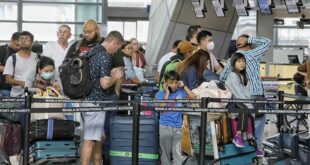By YVETTE TAN
In Avengers: Infinity War, Thanos wanted assemble the Infinity Gauntlet so he could eradicate half of all life in the universe because he claimed that genocide is what is needed to restore balance and to keep resources from being depleted by overpopulation. This was not his reason for doing so in the comic book, and people have since pointed out that if his only concern was resource depletion, why didn’t he just snap his fingers and wish for either double the resources, or the repair of the broken systems that caused the depletion in the first place?
While movies offer us an easy solution, reality is completely different. “We have eight billion people, and somehow they are keeping… alive without a food system. We drastically altered the planet in order to do that. Let us not forget that by 2050, we will be 10 billion. Add two billion more, and they are probably going to change their diets,” says author Glenn Denning, a professor at the Columbia University School of International and Public Affairs (SIPA). “As income increases, people want a more diversified diet; they want to eat better and eat more, so there is going to be a lot of pressure in the food system, and one of the factors driving that is the population.”
A world without hunger
In his book Universal Food Security: How to End Hunger While Protecting the Planet, Denning posits that a world without hunger is possible if the broken food system is repaired. Aside from three years of extensive research, he draws on decades of firsthand experience in the agriculture industry, particularly on food security issues, around the world (with a focus on Asia and Africa), including 18 years at the International Rice Research Institute (IRRI) in Los Baños.

“I really wanted it to be science-based, I wanted it to be based on evidence. I really felt there was too much confusion in the world of agriculture and food security, and I really want to bring clarity to it,” he said in a video interview, which has been condensed for brevity. “I have known about every expert in agriculture and food security over the years, so I could draw on them and also draw on my own experience, particularly for contexts and giving examples. I do not draw on it as evidence; I draw on it as a context, which is an important thing.”
Not a new thing
The thought that the world already produces enough resources to feed everyone in it if only it were distributed equitably is not new. “We basically understand what it takes to achieve universal food security, and by universal food security, the core is that every person on the planet, all eight billion people, can consume a healthy diet that is good for their growth, development, immunity, and all the other good things we want from a diet,” he said. “At the same time, that food can be produced and delivered in a sustainable way, meaning we are not doing it at the expense of the climate.”
What the book is, is a vision: “…the core argument that I used is that it is not based on some miracle… It is really going to require a comprehensive and contextual approach that cuts across not just agriculture but right across the food system in terms of the market infrastructure and managing post-harvest losses and waste, which means changing people’s diets and helping them towards a healthy diet. It also requires effective social protection programs for people who are in a position to help themselves.”
Cooperation is required
Denning cites what he calls “the big five,” a strategy for food systems investment composed of interrelated themes that need to be reinforced by core institutions such as government, businesses, universities, NGOs, and so on. These are: sustainable intensification, market infrastructure, postharvest stewardship, healthy diets, and social protection. “Agriculture is just one component; it is a very important piece, and we should not neglect it. But there are many other components that come together to create food security.”
Given that the world already has the resources needed to end global hunger, the challenge is getting stakeholders on board. “I guess different people and stakeholders have different reasons for not embracing these ideas. There’s a lot of … protection in terms of people’s discipline with work, whether they happen to be a rice person, a livestock person, or an aquaculture person. People focus on what they are interested in, and they kind of protect and advance.”
Getting everyone on board
Food security is especially important to governments because food security is highly relevant to national security. “In a world where people are hungry, hungry people are often angry people, and that is actually one of the reasons why governments take this quite seriously, at least in the short term. The problem with the government is that they do not have the luxury of thinking of the long term and they want to get results quickly. It needs to be made more clear to leaders that a lot of things and challenges that we are facing require a consistent long term effort, and quick fixes are not the answers.”
Denning’s “big five” answers what is needed to ensure a food secure world. He also posits how to get there. “I came to the conclusion that it really comes down to leadership, not just top leadership; it is leadership all through the system, across different sectors, and individuals who are informed and empowered to act, which requires an effort in itself. Of course, it starts at the top; it requires a leader who can articulate how important it is for a country to address food security,” he said.
“I have actually spoken to a few leaders in the past, and I say, ‘Make your political slogan the idea that a well nourished nation is a prosperous nation, so you focus a lot on food security.’ And why is it important for leadership? Top leadership is important because I believe it requires a whole government and society approach. It is now just saying, Ministry of Agriculture, you go on and that is your job. No, it is the Ministry of Agriculture; it is the Ministry of Health and the Ministry of Social Welfare. We need to have this whole government, and it is not just the government but the private sectors. Let us bring this business to the table; let us bring in the NGO’s and the third sector. Universities have to be part of all these.”
A world without hunger
A holistic way of managing already available resources is needed, and that requires a broad vision that is able to connect different areas and a leadership strong enough to see it through. “You can start with rice production, but it should not stop there. There should be support for vegetable production, healthy alternative sources of vitamins, and also livestock, which should be done sustainably in ways that do not damage the environment but are positive to the environment. And if you do that effectively, you can also reduce the pressure on the environment. You can stop deforestation and damage to coral reefs and natural ecosystems.”

Educating the next generation about the importance of this goal is important. To make the food system relatable, Denning suggests that students are taught the basics of cooking. “I personally believe that every student should understand the importance of food and diet because food science and preparation should be a required course in the same way that learning to read and learning quantitative mathematical skills,” he said. “This is a life skill that you need for the rest of your life, like reading, writing, and basic math skills. So I would definitely try to work with your education leaders to incorporate this; more young people need to learn how to cook, which is one thing that people are interested in these days by creative cooking.”
Achieving universal food security is possible, but not easy. Just as there is no one cause of the problem, there is no quick fix. “…this idea that it is going to take more than a miracle… it would not happen without actual individuals, with hands-on partnerships with the whole of society… where you bring everybody around a table together to solve the problem. I think it is possible, but as I say in the final words of the final chapter, who is going to step up and lead? I am throwing it back to the reader to say that you can lead; step up… [and] we have a real chance of achieving this vision.”
*****
Credit belongs to : www.mb.com.ph
 MaharlikaNews | Canada Leading Online Filipino Newspaper Portal The No. 1 most engaged information website for Filipino – Canadian in Canada. MaharlikaNews.com received almost a quarter a million visitors in 2020.
MaharlikaNews | Canada Leading Online Filipino Newspaper Portal The No. 1 most engaged information website for Filipino – Canadian in Canada. MaharlikaNews.com received almost a quarter a million visitors in 2020.







